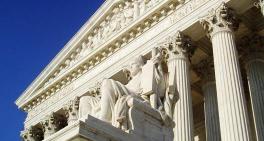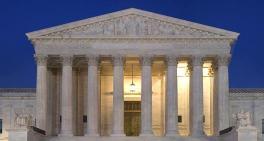Black Lives Matter rallies start in Australia amid court ban
United States Courts
The first of several Black Lives Matter protests across Australia on Saturday got underway against a backdrop of possible clashes between demonstrators and police in Sydney, after a court sided with police that the gathering posed too much risk for spreading the coronavirus.
The first gathering in the southern city of Adelaide was held to honor George Floyd and to protest against the deaths of indigenous Australians in custody.
That was the plan in Sydney as well, where thousands of people were expected to rally. But New South Wales state Supreme Court Justice Des Fagan ruled on Friday that the rally was not an authorized public assembly. Fagan said he understood the rally was designed to coincide with similar events in other countries.
“I don’t diminish the importance of the issues and no one would deny them in normal circumstances,” he said. “No one denies them that but we’re talking about a situation of a health crisis.”
Floyd, a black man, died in handcuffs while a Minneapolis police officer pressed a knee on his neck even after he pleaded for air and stopped moving. In Sydney, outdoor gatherings are restricted to 10 people, while up to 50 people can go to funerals, places of worship, restaurants, pubs and cafes.
Sydney rally organizers, before deciding to lodge a last-minute appeal to Fagan’s ruling, urged anyone still wishing to attend “as an individual” to obey social distancing and wear masks to ensure safety. On Friday, 2,000 demonstrators gathered in the national capital Canberra to remind Australians that the racial inequality underscored by Floyd’s death was not unique to the United States.
Related listings
-
U.S. Courts of Appeals
United States Courts 07/30/2017There are 13 appellate courts that sit below the U.S. Supreme Court, and they are called the U.S. Courts of Appeals. The 94 federal judicial districts are organized into 12 regional circuits, each of which has a court of appeals. The appellate ...
-
U.S. Supreme Court
United States Courts 07/30/2017U.S. Supreme Court The Supreme Court is the final judge in all cases involving laws of Congress, and the highest law of all — the Constitution. The Supreme Court, however, is far from all-powerful. Its power is limited by the other two branches...
-
National Courts
United States Courts 06/30/2017Judicial Panel On Multidistrict Litigati - ECF U.S. Court Of Federal Claims - ECF U.S. Court Of International Trade - ECF

Is Now the Time to Really Call a Special Education Lawyer?
IDEA, FAPE, CHILD FIND and IEPs: The Individuals with Disabilities Education Act (IDEA) guarantees all children with disabilities to a free appropriate public education (FAPE). FAPE starts with a school’s responsibility to identify that a child has a disability (Child Find) and create an Individualized Education Program (IEP) to suit the needs of the child. Parents need to be persistent, dedicated and above all else aware of the many services and accommodations that their child is entitled to under the law. As early as this point within your child’s special education, many parents will often find themselves in the situation asking, “is now the time to really call a special education lawyer?” Here are a few things to consider when asking yourself that question.




